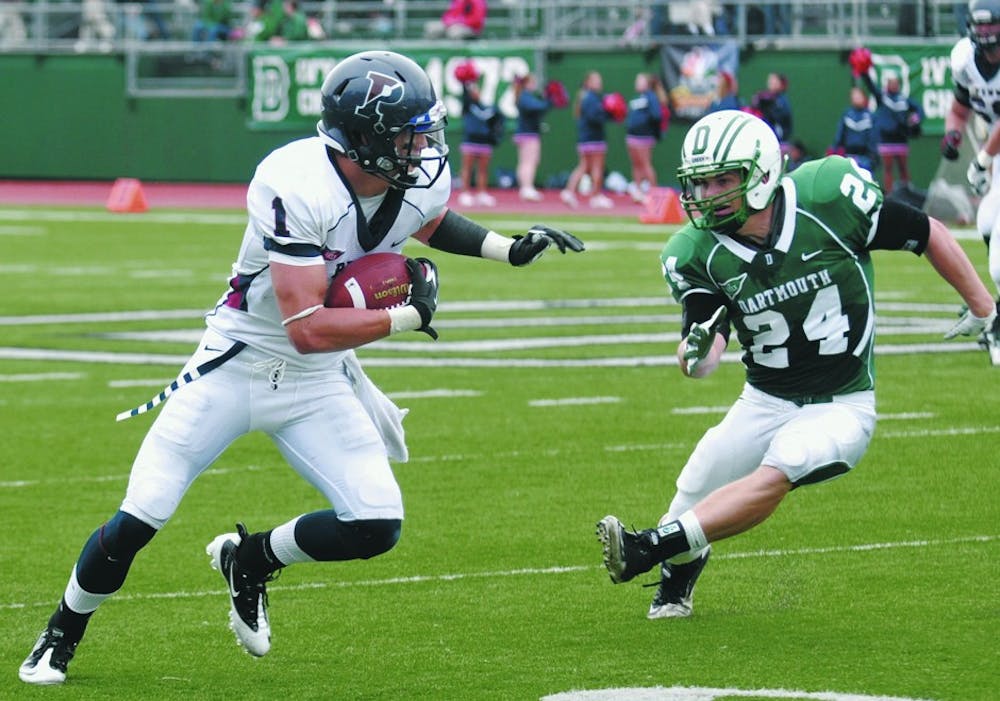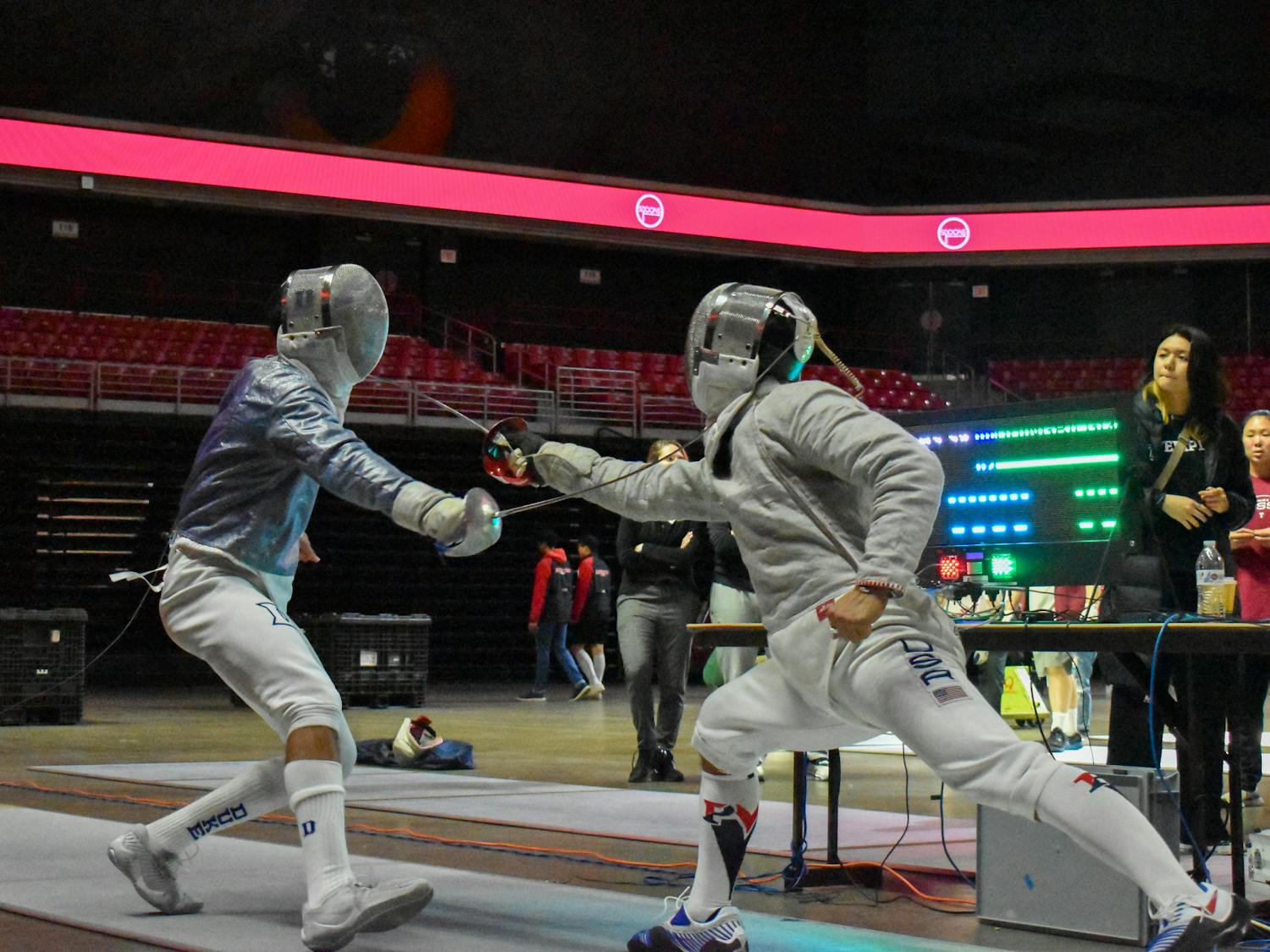After an intense back-and-forth battle in regulation, a blocked kick, four overtime periods, nearly four hours, and a bit of luck, Penn emerged victorious over Dartmouth as the winner of the Ivy League’s longest football game in history.
Over seven years later, the Quakers’ 37-31 win at Franklin Field still holds that record. The 2013 duel was close throughout, with neither team extending the lead by more than one score the entire game.
Critical plays from both sides kept momentum swaying from start to finish. Dartmouth junior safety Troy Donahue caught an interception in the first quarter to set Dartmouth up for the lead; Penn senior linebacker David Park returned a Dartmouth fumble for an 84-yard touchdown in the second quarter; Park blocked a 21-yard field goal attempt in the fourth quarter to send the game to overtime.
Despite the erratic nature of the game, then-defensive coordinator and current head coach Ray Priore emphasized the importance of a steadfast strategy.
“You have to stick with the game plan and you don’t go off script,” Priore said. “In a game like this, the team that doesn’t execute is the team that will lose. We kept our focus on the game: we matched what they did, we kept our poise, and we had to make them earn it.”
Priore’s resolute attitude paid off for the Quakers in their red zone defense. Dartmouth reached Penn’s red zone on eight separate occasions, but the Quakers' defense stopped them on four of those attempts.
Senior quarterback Billy Ragone said that Dartmouth felt like they were in control for a majority of the game. With both teams going back and forth, however, Ragone stressed that the game was never too far from reach.
“In the huddle, it’s a lot of encouragement,” Ragone said. “We had to keep everyone focused, taking it one play at a time, and thinking to ourselves, ‘We’ve come this far, we might as well get the job done.’”
RELATED:
All-time Penn football team: Defense
Coach Ray Priore brings decades of experience and expertise to Penn football
Ragone played a significant role in keeping the Quakers in the game down the stretch.
The second overtime period was the first time Penn had trailed Dartmouth since the first quarter. Faced with a third and 12, Penn’s only hope to force a third overtime was a touchdown. With the designed play broken down, Ragone escaped the pocket down the right side of the field for his longest rushing attempt of the season: a 27-yard touchdown.
“Throughout my career I had gotten used to using my legs to bail me out of trouble,” Ragone said. “Given the circumstances, it was extremely rewarding to be able to make a play. Our backs were against the wall and we had to turn a broken play into a positive one to stay in the game.”
Although Ragone threw two interceptions against Dartmouth, he was able to overcome those mistakes with big plays including a rushing touchdown and a passing touchdown.
“Having been the starter for a few years prior, I was familiar with the emotional highs and lows in big games,” Ragone said. “My teammates and coaches continued to believe in me and they knew that when the time came, there would be a big play to be made, and I would be a part of that.”
Dartmouth started the fourth overtime with the ball on Penn’s 25 — only five yards from Penn’s red zone and within field goal range. The Big Green ran the ball for a first down with their first play of the drive. Two plays later they found the end zone and looked set to take a one-score lead.
However, the touchdown was nullified by a 15-yard personal foul that would send Dartmouth back to Penn’s 26 for second and 22. From there, Priore’s defense didn’t let the visitors past the 20-yard line and a missed wide left field goal gave Penn’s offense the ball for a chance to win the game.
After two runs by junior Kyle Wilcox for two and three yards, respectively, he broke free on third and 5 with a 20-yard rushing touchdown to win the game.
“We took pride in running the ball,” Ragone said. “We were a run-first team and with an experienced offensive line we leaned on them and that gave us a chance to make some plays.”
Both Priore and Ragone agreed that the game was won with a deep running back core that gave Wilcox the ability to have fresher legs than his opponents heading into the fourth overtime. Ragone also cited a fair share of luck contributing to the win.
“When you’re looking at your opponents kick a field goal at the end of regulation, you know anything can happen,” Ragone said. “That day, the field goals went our way which the football gods have a lot to do with.”
The win was unlike any other. While he said that he had expected a contested matchup, Ragone said that he could have never predicted the game to break records. Following a brief celebration on Franklin Field, the Penn locker room fell quiet to the exhaustion of the players as their victory was etched into Ivy League history.









